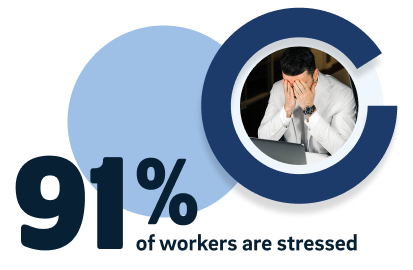
Employees report losing
over 7 hours of productivity
each week due to their financial stress.
Employees report losing
over 7 hours of productivity
each week due to their financial stress
Explore Results

The state of financial
well-being is grim

91% of employees are stressed about their finances, and it’s driven by inflation, high cost of living, higher interest rates, a potential recession, and market volatility.
Financial literacy and
preparedness remains low

Only 18% of employees have basic financial literacy. 79% have debt and 38% have no emergency savings or only enough for up to 2 months.
Employee stress is
translating to employer costs

Employees report losing an average of 7 hours of productivity each week due to financial stress, costing employers
$183 billion annually.*
Employers see and feel
the need to support
their employees

Employees say the top innovative benefit they want is financial wellness, and at least nine out of ten leaders believe they should provide financial well-being support.
Disconnects between
employees & leaders
are staggering

92% of leaders believe their company offers the financial guidance, support, and tools employees need to achieve their life goals, compared to 56% of employees.
Employer well-being is
the top priority for
business leaders

HR and C-Suite’s biggest people-related challenges this year are supporting employees’ holistic well-being, and attracting and retaining top talent.
Financial stress is affecting employee well-being and business success.
Discover the impact financial wellness can have in the workplace.
*Assumes there are 100,555,000 knowledge workers in the U.S. with an hourly wage of $40.20. 23% of knowledge workers have high or very high levels of financial stress and 54% of them have 7.3 hours of lost productivity per employee per week as a result of financial stress. Source: Federal Reserve Economic Dataset, BrightPlan.
On behalf of BrightPlan, Walr and Workplace Intelligence surveyed 1,400 knowledge workers at companies that have a global presence with 1000+ employees in the U.S. in January 2024. This included a mix of C-Suite, HR decision-makers and employees in various industries including technology, healthcare, financial services, education, manufacturing, energy, accounting, and government.
Report
This report looks at the state of financial well-being in 2024. Fill out the form to download the complete report.


